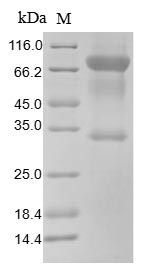Very nice to receive your inquiry.
R&D #140-B1-100 r- Human B7-1/CD80 Fc Chimera His-tag Protein, CF
Below is our corresponding product:
Recombinant Human T-lymphocyte activation antigen CD80(CD80),partial
CSB-MP004959HU1 >> Mammalian cell
Expression Region: 35-242aa; The complete extracellular domain.
Tag information:Tag type will be determined during the manufacturing process.
We will try C-terminal FC-tagged first,but as we can't guarantee, if it's failed, we can provide protein with other similar tag. (The success rate of expressing the protein with C-terminal FC-tagged is 95.25%)
Sequence:
VIHVTKEVKEVATLSCGHNVSVEELAQTRIYWQKEKKMVLTMMSGDMNIWPEYKNRTIFDITNNLSIVILALRPSDEGTYECVVLKYEKDAFKREHLAEVTLSVKADFPTPSISDFEIPTSNIRRIICSTSGGFPEPHLSWLENGEELNAINTTVSQDPETELYAVSSKLDFNMTTNHSFMCLIKYGHLRVNQTFNWNTTKQEHFPDN






